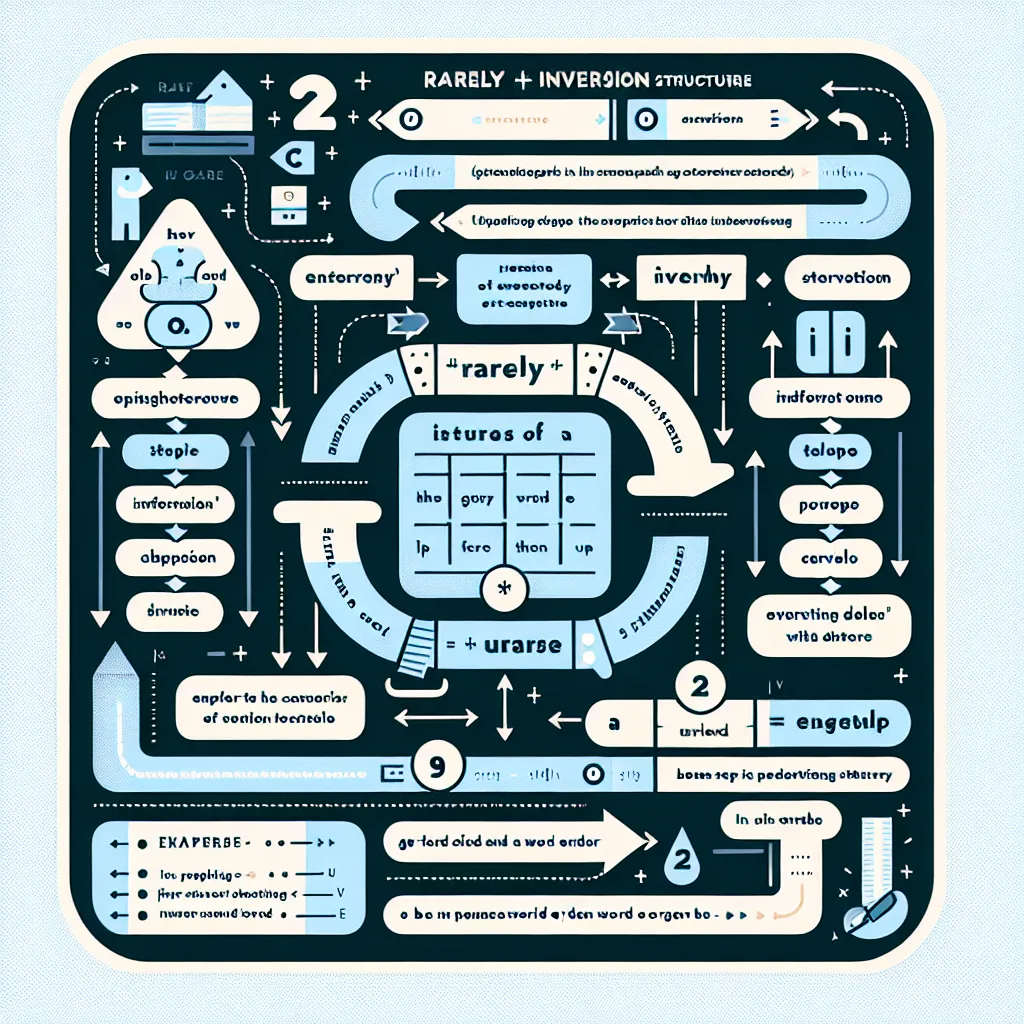The “Rarely + inversion structure” is a sophisticated grammatical construction that can significantly enhance your IELTS score when used correctly. This structure not only demonstrates a high level of English proficiency but also adds emphasis and variety to your writing and speaking. Let’s delve into the intricacies of this structure and explore how to effectively implement it in your IELTS exam.
Understanding the “Rarely + Inversion Structure”
The “Rarely + inversion structure” is a type of partial inversion where the adverb “rarely” is placed at the beginning of a sentence, followed by the auxiliary verb and then the subject. This structure is used to emphasize the infrequency of an action or situation.
Formula: Rarely + auxiliary verb + subject + main verb + rest of the sentence
For example:
- Rarely do we see such beautiful sunsets. (Instead of: We rarely see such beautiful sunsets.)
- Rarely has the world witnessed such rapid technological advancement. (Instead of: The world has rarely witnessed such rapid technological advancement.)

Frequency in IELTS Exams
This structure appears regularly in IELTS exams, particularly in the Reading and Listening sections. It’s also highly valued in the Writing and Speaking sections when used appropriately by test-takers. Mastering this structure can help you achieve higher band scores, especially in the Grammatical Range and Accuracy criterion.
Applying the “Rarely + Inversion Structure” in IELTS
IELTS Writing Task 2
In IELTS Writing Task 2, using the “Rarely + inversion structure” can elevate your essay and demonstrate sophisticated grammar usage. Here’s an example:
Topic: The impact of technology on traditional skills
“In today’s digital age, many traditional skills are becoming obsolete. Rarely do we see young people engaging in handicrafts or manual trades that were once commonplace. This shift has led to a decline in practical skills, as rarely are these abilities passed down through generations anymore. However, it’s important to note that rarely does technological progress completely eradicate the need for traditional skills; rather, it often transforms them into new forms.”
In this example, the structure is used three times, showcasing various applications and adding emphasis to key points.
IELTS Speaking Part 3
For the Speaking test, incorporating this structure can impress the examiner and boost your Grammatical Range score. Consider this example:
Question: How has technology changed the way people communicate in your country?
“Well, technology has dramatically altered communication patterns in my country. Rarely do people write letters nowadays; instead, they prefer instant messaging and social media. Rarely have we seen such a rapid shift in communication methods. However, it’s worth noting that rarely does this technological advancement come without drawbacks, such as decreased face-to-face interaction.”
Advanced Usage and Band 9 Examples
To aim for a Band 9 score, it’s crucial to use this structure naturally and in conjunction with other advanced grammatical forms. Here’s an example that combines the “Rarely + inversion structure” with other complex structures:
“Rarely in human history has technological innovation progressed at such a breakneck pace, transforming not only how we work and communicate but also how we perceive the world around us. Rarely do we pause to consider the long-term implications of this rapid change, despite its profound impact on our daily lives. It is imperative that we critically examine these advancements, for rarely does unchecked progress lead to unequivocally positive outcomes.”
This paragraph showcases the structure in various forms while maintaining a cohesive and sophisticated argument.
Common Mistakes to Avoid
-
Incorrect word order:
- Incorrect: Rarely we do see such behavior.
- Correct: Rarely do we see such behavior.
-
Using with non-auxiliary verbs:
- Incorrect: Rarely saw I such a beautiful sunset.
- Correct: Rarely did I see such a beautiful sunset.
-
Overuse:
While this structure is impressive, overusing it can make your writing seem forced. Use it sparingly and naturally. -
Forgetting to invert in questions:
- Incorrect: Rarely you have seen such dedication?
- Correct: Rarely have you seen such dedication?
-
Using with positive frequency adverbs:
Remember, this structure is typically used with negative or limiting adverbs.- Incorrect: Often do we see such behavior.
- Correct: Rarely do we see such behavior.
Conclusion
Mastering the “Rarely + inversion structure” can significantly enhance your IELTS performance across all sections of the test. By understanding its usage, practicing with varied examples, and avoiding common pitfalls, you can effectively incorporate this advanced grammatical structure into your English repertoire. Remember to use it judiciously and in context to maximize its impact on your IELTS scores.
For further practice, try incorporating this structure in essays about environmental changes, technological advancements, or societal shifts – topics where emphasizing the rarity or infrequency of certain phenomena can be particularly effective.